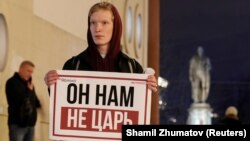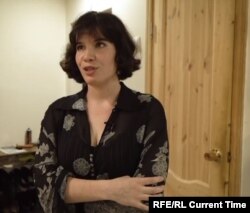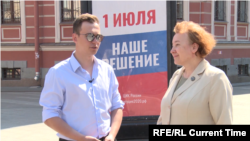Between June 25 and July 1, Russians will decide whether or not 206 amendments that could transform the role of the president and the status of citizens’ rights should become part of their constitution. Although all of these changes already have been approved by President Vladimir Putin and the legislature, President Putin has stated that they will become law only with Russian voters’ approval.
Until voting ends on July 1, Current Time will take a look each day at the most substantial proposed changes.
The Daily Amendment: Presidential Term Limits
The proposal to turn back the clock to zero on 67-year-old Vladimir Putin's four terms as president ranks as arguably the most controversial aspect of Russia's June 25-July 1 vote on constitutional reforms.
Seventeen years ago, Putin, three years into his first term as president, opposed changing the constitution so that Russia’s presidents could stay in office longer than two terms in a row. But after 20 years in power as president or prime minister, his views have apparently changed.
Although Putin has not disclosed his specific plans for the future, he has made plain that he will not slam the door on running for president again.
What’s Changing:
Under Article 81 of Russia’s current constitution, a president can serve only two consecutive terms. That means that the clock would run out on President Putin in 2024.
The proposed revision to Article 81 would retain this two-term limit, but remove one key word: “podryad” or “in a row.”
In 2008, this word meant that, after serving two (then four-year) terms as president, Putin had to take a time out. The presidential baton passed to political ally Dmitry Medvedev, who duly named him prime minister. Putin returned as president in 2012 .
But this time, when Putin's second set of two terms expires in 2024, the revised amendment, if passed, could expand his options. The presidential term limit will apply to the person occupying the office of president at the time the amendments are adopted, but without calculating the time he or she has already served. That individual, therefore, can run for office again.
If the amendments are passed,President Putin will be able to be elected for another six years, until 2030, and, then, potentially, for a second term as well. That would leave him in office until 2036, when he will turn 84 years old.
How This Amendment Came About:
The constitutional amendments’ first draft did not include any reference to setting the clock back to zero for the current president’s terms. But then, the first female Soviet cosmonaut, Valentina Tereshkova, a member of parliament for the ruling United Russia Party, addressed the State Duma.
“If the situation demands this and, most importantly, if the people want this,” Tereshkova, 83, declared on March 10, then, the president should have the possibility to run for office again, she said.
Appearing before the Duma the same day, President Putin approved the concept of setting his presidential terms back to the starting point – if voters give the option a thumbs-up and the Constitutional Court signs off on its constitutionality, he underlined.
The proposal to reset the president’s terms to zero means “removing the limit for any person, any citizen, including the acting president, and to allow [them] to take part in future elections,” he said. “Naturally, in open and competitive elections.”
Out of the Duma’s 450 members, only 43 deputies, made up mostly of Communist Party members, opposed restarting the clock on Putin’s terms.
At the end of March, individuals in Moscow and other cities staged one-person protests against this amendment. But self-isolation and social-distancing measures against the COVID-19 pandemic eventually led to the end of these demonstrations.
The debate, however, continues among different generations of Russian voters.
What Ordinary Voters Say:
Twenty-seven-year-old potter Sofia Malinovskaya, a resident of Moscow, was in first grade when Vladimir Putin became president. She sees no reason for him to continue in office until 2036, when she will be 42.
Opposed to the constitutional amendments, she plans to boycott the vote, which she considers a farce.
“This is theater,” Malinovskaya scoffed. “It’s important for Putin and the government to allow him to stay in power as long as possible. And even if that doesn’t work out, even if he won’t be president, all the same, he’ll stay in an active role.”
Yet for 46-year-old composer Marina Shevtsova, that would be an ideal scenario. “I’ll be honest with you, I’m a hard-core Putin fan (putinka),” she said.
Like many Russians of her generation, Shevtsova, who lives in the Moscow suburb of Zelenograd, sees Putin as a guarantee against the economic instability and political upheavals that followed the 1991 collapse of the Soviet Union.
At the time, to make ends meet, Shevtsova had to give up university and work as a croupier in a casino and a cleaning woman.
“Why am I not afraid that [Putin] will be [in power] until 2036? Well, because it would be worse to stay in chaos and disorder,” she said. “We don’t have any worthy successor” to Putin.
To the north, in St. Petersburg, Lyudmila Kunina, in her mid-50s, agrees.
“In Russia, there’s a longing for a steady rule. And for a rule that’s sufficiently tough,” she commented.
But her son, liberal municipal council deputy Vitaly Kunin, born the year that Russia’s 1993 constitution came into being, sees the amendments vote as a “special operation” for turning Putin into a “lifelong tsar.”
“I was 7 years old when Vladimir Putin came into power, as you remember,” Kunin said, addressing his mother. “This doesn’t seem to you to be overkill? What if the government, at least sometimes, changes?”
“I haven’t only lived under Putin,” she replied. “And I know that much worse is possible. I want to avoid this ‘much worse’.”
A ‘State Coup’ For Putin’s Sake?
With an approval rating of 60 percent, Putin may have seen his popularity sag under the effects of the COVID-19 pandemic, economic troubles, and outrage at corruption, but, according to independent pollster Levada, he still ranks as the politician surveyed Russians trust the most.
In a survey Levada, a critic of the proposed amendments, ran in late June, Putin secured the trust of 26 percent of 1,622 respondents. But, at 32 percent, “It is difficult to say” still leads the field.
Politicians, political analysts, attorneys, and civil-society figures have zeroed into this apparent lack of resounding trust in Putin to argue that the back-to-zero amendment amounts to an attempt to usurp power, come 2024.
“A state coup is what Putin has done,” political analyst Natalia Shavshukova declared live on the Kremlin-allied TV channel NTV in March. “And I think that everyone understands that the vote [on the amendments] is not legitimate. Voting ‘no’ is the duty of each citizen of the Russian Federation.” (NTV subsequently rescinded an invitation for Shavshukova to appear on a future program, she claimed.)
In line with that thinking, more than 350 scholars, lawyers, journalists, and writers addressed an open letter to legislators, public figures, and the Constitutional Court that also denounced the adoption of the proposed 206 amendments as an “anti-constitutional coup.”
On March 16, however, the Constitutional Court, whose judges are nominated by the president, ruled that the proposed changes do not violate Russia’s Basic Law, as the constitution is called.
Together with the amendment on presidential term limits, other measures such the amendments on marriage, mention of God, defense of Russia’s territorial sovereignty, and the indexation of pensions became even more part of an “ideological framework of changes,” commented political analyst Mikhail Vinogradov.
To political scientist Dmitry Oreshkin, however, the decision to put these amendments to a national vote is essentially a charade.
"Putin didn’t want to proclaim himself just a usurper, someone who’s seized power,” Oreshkin charged. “He wants a prop in the form of a so-called national vote.”
Central Election Commission Chairwoman Ella Pamfilova, though, rejects that view as “primitive.”
If President Putin had just wanted to stay in office, she remarked in a June 30 broadcast on state-run TV, it would have been possible to do this with a lot less difficulty, effort, and “without amendments to the constitution …”
-This report includes material from TASS and Znak.








